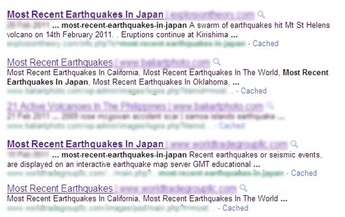Internet Lowlifes Already Targeting Japan Quake Search Results
With much of the world’s focus on the tragic earthquake in Japan, Internet security watchers are warning about dangerous web pages showing up in some quake-related search results. Trend Micro reported earlier this morning that malware sites had started targeting search terms shortly after the quake hit. As shown in the image above, Trend Micro […]
With much of the world’s focus on the tragic earthquake in Japan, Internet security watchers are warning about dangerous web pages showing up in some quake-related search results.
Trend Micro reported earlier this morning that malware sites had started targeting search terms shortly after the quake hit. As shown in the image above, Trend Micro found several sites offering fake anti-virus software in the search results for the term, “most recent earthquake in Japan.” Thanks to Trend Micro’s post and related coverage, the first page of Google’s results for that phrase now includes several articles about the malware. (Bing’s results, at the moment, are a little more suspect than Google’s, though I haven’t clicked through to visit any pages from either search engine.)
This is a common happening after major news events, with similar reports after the recent earthquakes in Haiti and Chile. Spammers and malware sites make a habit of targeting hot search topics. Last spring, we reported on one study that claimed some “hot” Google searches returned 90% malicious links.
Contributing authors are invited to create content for Search Engine Land and are chosen for their expertise and contribution to the search community. Our contributors work under the oversight of the editorial staff and contributions are checked for quality and relevance to our readers. The opinions they express are their own.
Related stories
New on Search Engine Land
